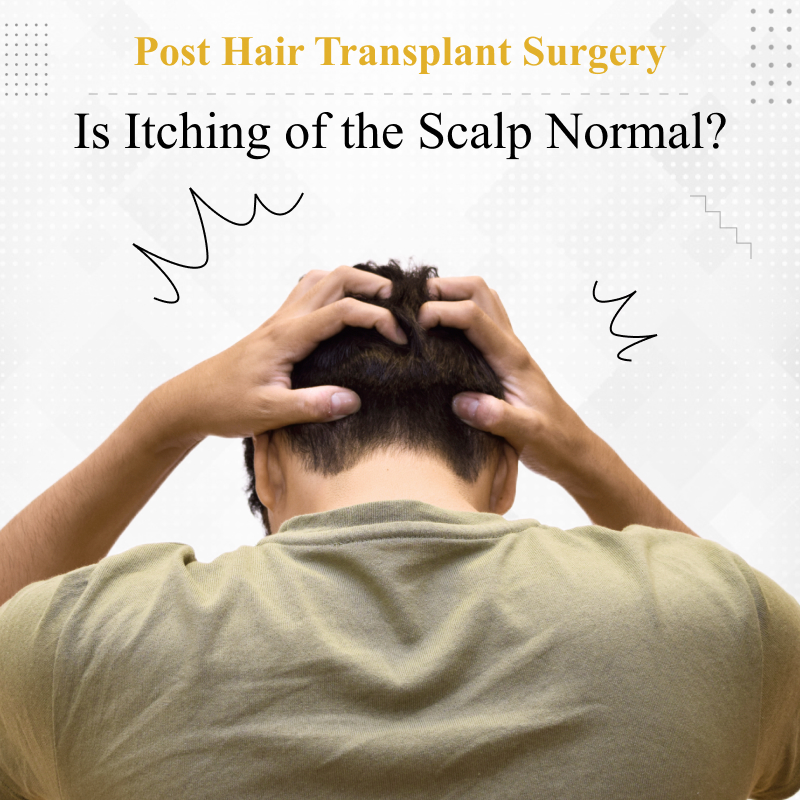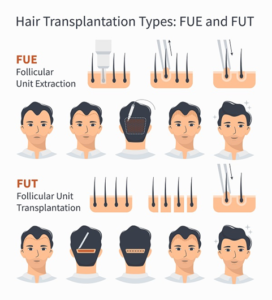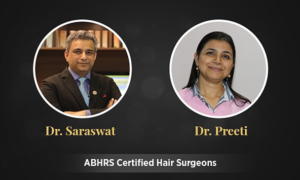
Undergoing a hair transplant surgery might be one of the most exciting things in your life because it is a permanent solution to hair loss due to Androgenetic Alopecia (genetic hair loss). However, having second thoughts about the surgery and the hair transplant side effects is natural for first-time patients, and knowing what would transpire during the treatment can help ease your anxiety. One of the most common questions that most patients have is, “will my scalp itch during the recovery period?” Well, let’s take a look at what ABHRS (American Board of Hair Restoration Surgery) certified experienced doctors have to say on the subject.
The Hair Transplant Surgery Healing Process
The hair transplant process revolves around extracting healthy hair follicles from one part of the side (or body) using special tools, depending on the technique being used and then implanting the same to the recipient balding area. Talking about which, hair transplant is performed majorly in two methods:

- FUE: An acronym for Follicular Unit Excision, this process involves extracting individual follicles directly from the scalp and then implanting them to the recipient area at once. The whole process is quick, and it leaves no linear scar in the process.
- FUT: An acronym for Follicular Unit Transplantation, also known as strip surgery or Linear Excision Method, it involves taking a strip of healthy hair-bearing scalp from the donor area of the scalp and then slivering them under a specialized microscope to extract individual grafts. Those grafts are used for implantation in the pre-made incisions of the balding area. The process leaves a linear scar at the donor area after it has been sutured in a Trichophytic closure which gets hidden once new hair growth happens.
When it comes to hair transplant surgery, depending on your condition and the status of the donor hair on the scalp, the surgeon might also suggest you undergo procedures such as:
- Body hair transplant
- High-density hair transplant
- Beard hair transplant
- Special area hair transplant
- Preview long-hair non-shaven hair transplant
Irrespective of the technique being used for the surgery, during the process, tiny incisions are made on the scalp which, when healing, have a high chance of itching. At this moment, you need to know that the entire surgery is done after administering ring block local anaesthesia that ensures you are awake the whole time but can feel nothing.
The incision wounds created during the process are like any other cuts or wounds on the bodies and are meant to heal the same way. Since the skin is injured, a protective scrap would form over the wound so that there is no chance of getting infected. The entire recovery process will happen under close observation of the doctor, and you are given a list of post-operation instructions to follow so that there are no hair transplant side effects.
When Would the Itching Go Away?
More often than not, the itching post a hair transplant surgery lasts for a week or so. The doctor would give you a spray bottle filled with saline water to use during this time on the scalp. This is done to ensure that the newly implanted hair follicles are not disturbed and get enough time to settle down in their new surroundings. Once you keep spraying the water on your scalp as instructed by your doctor, the itching is supposed to slowly improve.
Immediately post hair transplant surgery, you are asked to avoid as much direct sunlight as possible along with strenuous exercises or stress-inducing activities. You are also instructed to keep your head in an elevated position after the procedure so that the follicles don’t have to face any additional stress. If you still feel any discomfort during this period, you are advised to immediately get in touch with the doctors who have performed the surgery to get a better understanding of your situation post-transplant.
Why Consult the Experts at Saraswat Hospital?
Hair transplant is an aesthetic surgery that leaves permanent results and thus should always be performed by experts in the field. Experienced doctors who are certified by ABHRS or ISHRS (International Society of Hair Restoration Surgeons) can assess your condition the best and provide customized treatment plans to derive the ideal results. Saraswat Hospital in Agra is one such hair transplant clinic that is led by two of the finest doctors in India – Dr Satya Kumar Saraswat and Dr Preeti Saraswat.

Dr Satya Kumar Saraswat is an MBBS with MS, M.Ch, and DNB (Plastic Surgery) degrees to his credit. As a member of several international boards, Dr Saraswat has left his mark in the plastic surgery sector. He is known to specialize in various kinds of hair restoration surgeries and has also presented his take on a modified FUT technique at the 24th World Congress of ISHRS.
Dr Preeti Saraswat is an MBBS with a PGDCC degree from the University of Greifswald, Germany. She is a diplomate of ABHRS and a lifetime member of ISHRS (International Society of Hair Restoration Surgery) with 7+ years of experience in providing hair transplant surgeries to patients. She is known for the scalp micropigmentation treatments that she has been rendering to her patients over the years. She is also a member of the American Academy of Aesthetic Medicine (AAAM).
With more than 17 years of experience in the field, the doctors perform a thorough hair and scalp Trichoscopy Analysis to understand your condition better and prescribe the best treatment to the same. Saraswat Hospital provides a transparent price range of the procedure that mentions the entire breakout in detail. The clinic uses modern equipment and the latest technology in the field to perform the surgery in the most efficient techniques.
To Sum it Up,
An itchy scalp as a hair transplant side effect is more common than you think, and there is nothing to get worried about if you’re facing this situation. What you need to do is be in close connection with the doctors performing your surgery and keep them updated throughout the recovery period. If you want to discuss more on the subject, feel free to get in touch with the experts at Saraswat Hospital and book a consultation with them today.
Dial+91-9690039999 / +91-9258386320 or send an email to saraswathospitalagra@gmail.com.



